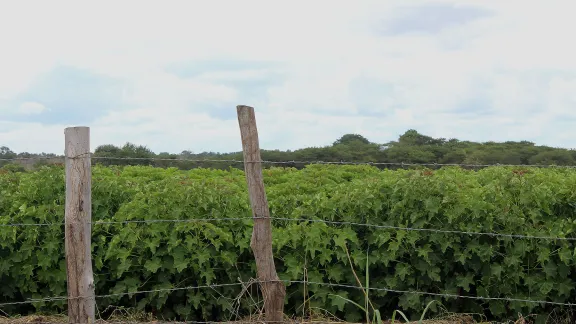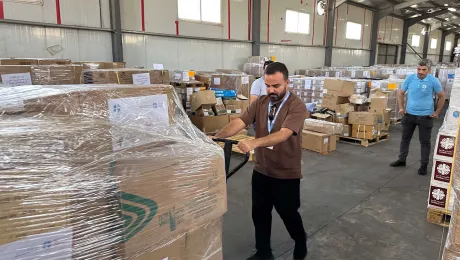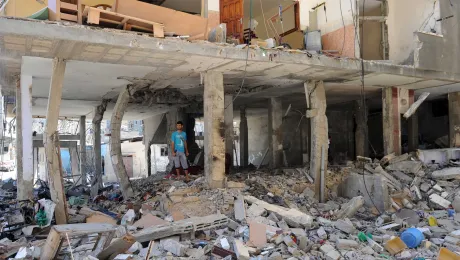
A crop of jatropha, an oil fruit used for biofuel production in central Mozambique. Photo: Justa Paz
Mozambican land rights advocates seek justice for victims of risky investments deals
(LWI) “They came as thieves!” says 65-year-old *Antonio. He is among farmers in Grudja village, central Mozambique, where a standoff exists between a private investor and the locals over the purchase of huge tracts of land for large-scale production of a biofuel crop.
In 2008, together with four other neighbors, Antonio gave up 80 hectares of his land to Niquel Company, a private investor who promised schools, machinery and employment in return. The locals were supposed to be the main beneficiaries but nearly a decade later, all that remains is an enormous field of bushes outside the village, where the company farms jatropha, an oil fruit used for biofuel.
In a context where land is owned and managed by the community through a village chief and overseen by the state, many in Grudja did not question the biofuel project. Indeed, the process seemed transparent, with the local authorities involved in identifying the land to be transferred to the investor, and determining compensation to be paid out to farmers.
Legally to use the land, these companies would need a community’s permission, which should be granted after a consultation process. But this rarely happens, says Nordine Ferrao, advocacy officer for Justa Paz, a local organization promoting human rights and social justice. He says some of the investors apply speculative land acquisition models that do not oblige them to actually buy the land in the end. Indeed, case studies have revealed that their goal is rarely to engage the locals in effective production but rather in risky deals that make the farmers the major losers.
Land rights and land grabbing emerged as key issues in Mozambique around 2009, with the entry of biofuel investment projects and a government policy to develop new and renewable energy. Civil society concern increased after approval of the Prosavana Project, involving an area of 11 million hectares—nearly the size of neighboring Malawi. The goal of the government’s economic growth model, was to encourage foreign investment that would transform the country including its potential as a key biofuel exporter.
Many promises
In Grudja and other villages in Sofala Province, The Lutheran World Federation (LWF) supports the work of Justa Paz and other organizations that are educating people affected by land grabbing about their rights, legalizing land ownership and sometimes mediating between different parties.
During a visit by a team representing the locals, the Grudja estate manager for Niquel company said he saw no sense of wrongdoing by the investor. “We were always clear on what we are doing and what they would get,” he said, arguing that the community had agreed to the deal. “When we started here 10 years ago, we talked to the community,” he insisted.
But it seems the villagers, many of them illiterate, were victims of a power game between foreign investors, the government and their own village leader, particularly as no documentation was ever kept.
“Foreign companies come to a community and move houses and fields without compensation,” says *Luisa, who works for a local organization. “Often, there is no consultation with the community as demanded by the law. One person, usually the village chief, signs away the land for the entire village.”
“Foreign companies come to a community and move houses and fields without compensation. [...] Often, there is no consultation with the community as demanded by the law. One person, usually the village chief, signs away the land for the entire village."
From local to global
In 2016, several community-based organizations supported by the LWF raised the Grudja farmers’ case with the investment company. A case study, documenting the grievances of the communities was represented through the non-profit London-based Business and Human Rights Resource Centre (BHRRC). However, this initial attempt for dialogue was met with defiance and threats from the company management, pitting the villagers against more powerful actors.
But Mozambican civil society, supported by the LWF and BHRRC persisted and got the company to agree to talks. At the time of publishing this story, the mediation process promised by Niquel following a meeting in Beira in 2017 had not begun. However there is hope that the farmers’ grievances will be addressed.
“It is not our position to blame or accuse anyone,” Ferrao emphasizes. “Our position is to have a good relationship between the community, government and private sector.”
LWF’s advocacy work for land rights in Mozambique is part of an emergency and later World Service country program that was established to resettle returning refugees after the 1992 civil war. Since closing down its country office in 2017, the LWF works through local partners such as Justa Paz. Other diaconal work continues through the Evangelical Lutheran Church in Mozambique.
*Names have been changed to protect the identity of individuals.


